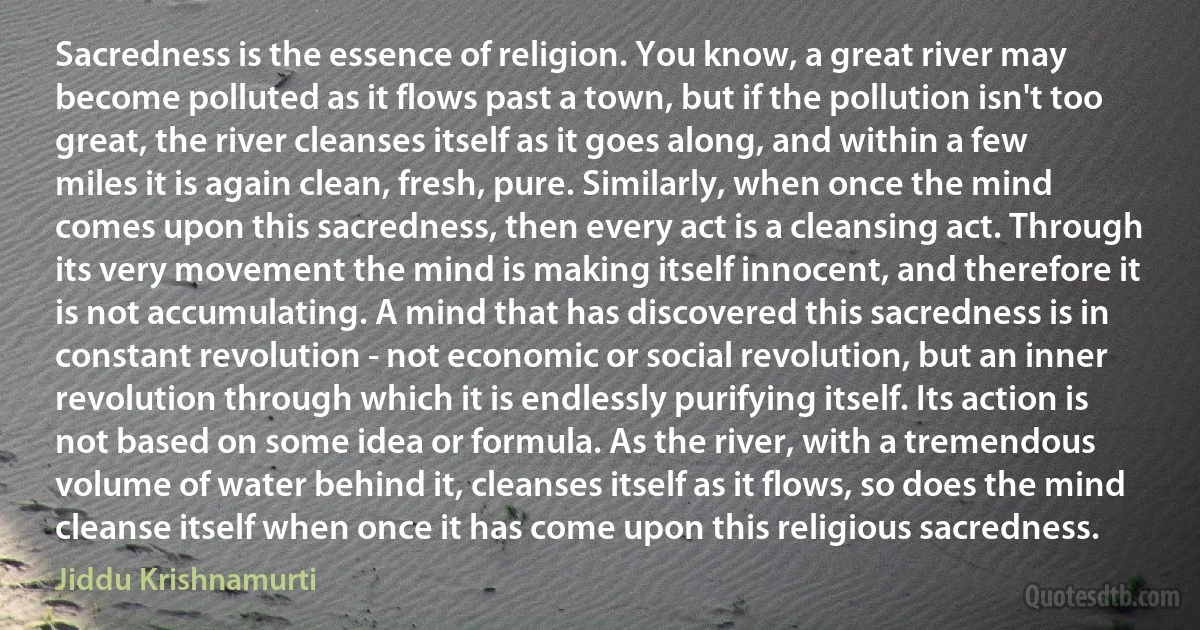
Sacredness is the essence of religion. You know, a great river may become polluted as it flows past a town, but if the pollution isn't too great, the river cleanses itself as it goes along, and within a few miles it is again clean, fresh, pure. Similarly, when once the mind comes upon this sacredness, then every act is a cleansing act. Through its very movement the mind is making itself innocent, and therefore it is not accumulating. A mind that has discovered this sacredness is in constant revolution - not economic or social revolution, but an inner revolution through which it is endlessly purifying itself. Its action is not based on some idea or formula. As the river, with a tremendous volume of water behind it, cleanses itself as it flows, so does the mind cleanse itself when once it has come upon this religious sacredness.
Jiddu KrishnamurtiRelated topics
act action behind clean cleansing comes constant few fresh great idea innocent making mind once past pure purifying religion revolution river town water sacredness milesRelated quotes
They (the Hindus) differ from us in religion... There is very little disputing about theological topics among themselves; at the most they fight with words, but they will never stake their soul or body or their property on religious controversy. ... in all manners and usages they differ from us to such a degree as to frighten their children with us... and as to declare us to be devil's breed and our doings as the very opposite of all that is good and proper, ....they call all foreigners as mleccha, i.e. impure, and forbid having any connection with them, be it by intermarriage or any other kind of relationship, or by sitting, eating, and drinking with them, because thereby they think, they would be polluted... They are not allowed to receive anybody who does not belong to them, even if he wished it, or was inclined to their religion.

Al-Biruni
When the dialectical method is applied to the study of economic problems, economic phenomena are not viewed separately from each other, by bits and pieces, but in their inner connection as an integrated totality, structured around, and by, a basic predominant mode of production. This totality is analysed in all its aspects and manifestations, as determined by certain given laws of motion, which relate also to its origins and its inevitable disappearance. These laws of motion of the given mode of production are discovered to be nothing but the unfolding of the inner contradictions of that structure, which define its very nature. The given economic structure is seen to be characterized at one and the same time by the unity of these contradictions and by their struggle, both of which determine the constant changes which it undergoes.

Ernest Mandel
Are we, in blind obedience to primitive instincts and old prejudices, enslaved by the old catchwords and that curious indolence which makes the revision of old ideas unpleasant, to duplicate indefinitely on the political and economic side a condition from which we have liberated ourselves on the religious side? Are we to continue to struggle, as so many good men struggled in the first dozen centuries of Christendom - spilling oceans of blood, wasting mountains of treasure - to achieve what is at bottom a logical absurdity, to accomplish something which, when accomplished, can avail us nothing, and which, if it could avail us anything, would condemn the nations of the world to never-ending bloodshed and the constant defeat of all those aims which men, in their sober hours, know to be alone worthy of sustained endeavor?

Norman Angell
In a capitalist democracy there are essentially two methods by which social choices can be made: voting, typically used to make ‘political' decisions, and the market mechanism, typically used to make ‘economic' decisions. In the emerging democracies with mixed economic systems Great Britain, France, and Scandinavia, the same two modes of making social choices prevail, though more scope is given to the method of voting and to decisions based directly or indirectly on it and less to the rule of the price mechanism. Elsewhere in the world, and even in smaller social units within the democracies, the social decisions are sometimes made by single individuals or small groups and sometimes (more and more rarely in this modern world) by a widely encompassing set of traditional rules for making the social choice in any given situation, for example, a religious code.

Kenneth Arrow
True Religion does not manifest itself outwardly, and impels man to no course of external conduct which he would not otherwise have adopted, but that it only completes his true In ward Being and Dignity. It is neither an Action, nor an incentive to Action, but a Thought:-it is LIGHT, and the One True Light, which bears within it all Life and all the forms of Life, and pervades their innermost substance. Once arisen, this Light flows on spontaneously forever, spreading itself forth without term or limit;-and it is as idle to bid it shine, as it would be to address such a command to the material sun when it stands in the noon-day heavens. It does this without our bidding; and if it shine not, then has it not arisen. At its uprising, Darkness, and the brood of spectres and phantasms which are born of Darkness, vanish of themselves.

Johann Gottlieb Fichte
